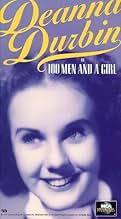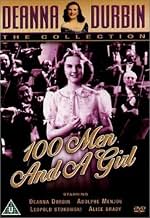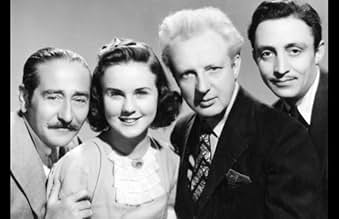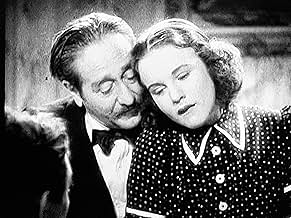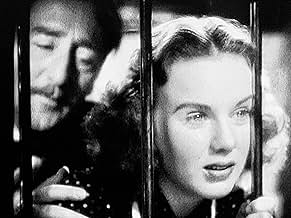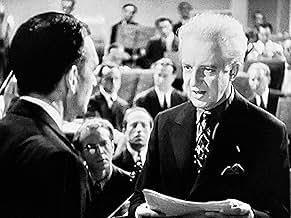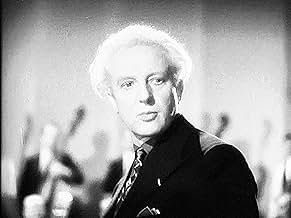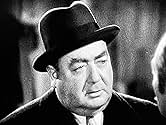Aggiungi una trama nella tua linguaThe daughter of a struggling musician forms a symphony orchestra made up of his unemployed friends and through persistence, charm and a few misunderstandings, is able to get Leopold Stokowsk... Leggi tuttoThe daughter of a struggling musician forms a symphony orchestra made up of his unemployed friends and through persistence, charm and a few misunderstandings, is able to get Leopold Stokowski to lead them in a concert that leads to a radio contract.The daughter of a struggling musician forms a symphony orchestra made up of his unemployed friends and through persistence, charm and a few misunderstandings, is able to get Leopold Stokowski to lead them in a concert that leads to a radio contract.
- Vincitore di 1 Oscar
- 1 vittoria e 4 candidature totali
- Stage Doorman
- (as Jack Smart)
- Party Guest at Mrs. Frost's
- (non citato nei titoli originali)
- Adams -- Stokowski's Butler
- (non citato nei titoli originali)
Trama
Lo sapevi?
- QuizLeopold Stokowski recorded the classical music in the film at the Philadelphia Academy of Music, using the Philadelphia Orchestra (of which he was still principal guest conductor), on a multi-channel sound system, the first time one was ever used to record music in a film. The musicians seen in the film, however, were L.A.-based players doing what was called "sideline" (seen but not heard, merely miming to a prerecorded soundtrack played by others).
- BlooperThe position of Patsy's hands when she's crying on the bed.
- Citazioni
Leopold Stokowski: [Patsy has come to apologize for telling a newspaper that Stokowski would be conducting her orchestra of jobless musicians] But why did you do it? You must have had a reason.
Patricia "Patsy" Cardwell: Oh, yes! I had a hundred reasons! Would you like to hear them?
Leopold Stokowski: I certainly would.
Patricia "Patsy" Cardwell: [Goes to the door of his study and counts:] One! Two! Three! Four!
[And Stokowski suddenly hears "Hungarian Rhapsody" as clear as a bell inside his own house! He and she go out onto his balcony overlooking the entryway. The 100 men are standing on the stairway, playing]
Patricia "Patsy" Cardwell: Those are my reasons. I thought you'd like to hear them.
[Stokowski listens until the piece is nearly over, and then starts conducting with his hands]
- ConnessioniFeatured in NET Festival: Leopold Stokowski (1970)
- Colonne sonoreSymphony No. 5 in E minor: Fourth Movement
(1888)
Music by Pyotr Ilyich Tchaikovsky (as Tschaikowsky)
Played by a symphony orchestra conducted by Leopold Stokowski
"One Hundred Men and a Girl" is a wonderful family-type film to share with others. Made during the Great Depression, it gave the audience an optimistic view that those out of work would find jobs, or as the New Deal spin-doctors put it, "Prosperity is just around the corner." Patsy (Deanna Durbin) attempts to put her unemployed father John Cardwell, played to perfection by the marvelous actor Adolphe Menjou, back to work as a trombone player. She tries to convince classical director Leopold Stokowski to put her father in his orchestra but to no avail. While returning a pocketbook her father found to a wealthy society matron (Alice Brady), she misunderstands a joke as a serious proposal to offer a radio contract to her father if he can get an orchestra together composed of his out of work musician friends. The rich lady's husband John Frost is brought into the deal when his wife suddenly leaves for an extended vacation in Europe. The rest of the film revolves around Patsy getting it all together by persistence and unknowingly giving the story to the media. For viewers, it's fun all the way.
There is also an assortment of gifted character actors to add mirth and merriment to the proceedings, to name a few: Eugene Palette, Mischa Auer, and one of the funniest men in the movies Billy Gilbert. Of particular note is a hilarious performance given by Frank Jenks as a singing cab driver with a penchant for opera who appreciates Deanna's talent.
A bonus is all the fantastic classical music played by Stokowski and his orchestra. Stokowski was everyone's ideal of what a conductor should look like and sound like. Disney recognized this and put him in "Fantasia." Stokowski was largely responsible for bringing classical music from its long hair ivory tower status to make it accessible to the average American. All this plus the enchanted singing of Deanna Durbin. Who could ask for anything more?
A postscript: Keep your eye on the feather in Deanna's hat.
I più visti
- How long is One Hundred Men and a Girl?Powered by Alexa
Dettagli
- Data di uscita
- Paese di origine
- Lingua
- Celebre anche come
- One Hundred Men and a Girl
- Luoghi delle riprese
- Azienda produttrice
- Vedi altri crediti dell’azienda su IMDbPro
Botteghino
- Budget
- 762.000 USD (previsto)
- Tempo di esecuzione1 ora 24 minuti
- Colore
- Proporzioni
- 1.37 : 1
Contribuisci a questa pagina


